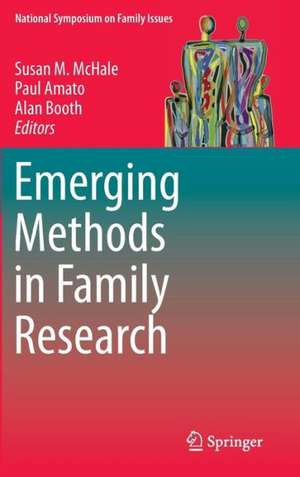Emerging Methods in Family Research: National Symposium on Family Issues, cartea 4
Editat de Susan M. McHale, Paul Amato, Alan Boothen Limba Engleză Hardback – 28 oct 2013
Emerging Methods in Family Research details innovative approaches designed to keep researchers apace with the diversity and complexities of today's families. This versatile idea-book offers meaningful new ways to represent multiple forms of diversity in family structure and process, cutting-edge updates to family systems models and measurement methods, and guidance on the research process, from designing projects to analyzing findings. These chapters provide not only new frameworks for basic research on families, but also prime examples of their practical use in intervention and policy studies. Contributors also consider the similarities and differences between the study of individuals and the study of family relationships and systems. Included in the coverage:
Use of nonlinear dynamic models to study families as coordinated symbiotic systems.
- Use of network models for understanding change and diversity in the formal structure of American families.
- Representing trends and moment-to-moment variability in dyadic and family processes using state-space modeling techniques.
- Why qualitative and ethnographic methods are essential for understanding family life.
- Methods in multi-site trials of family-based interventions.
- Implementing the Multiphase Optimization Strategy (MOST) to analyze the effects of family interventions.
| Toate formatele și edițiile | Preț | Express |
|---|---|---|
| Paperback (1) | 999.27 lei 43-57 zile | |
| Springer International Publishing – 27 aug 2016 | 999.27 lei 43-57 zile | |
| Hardback (1) | 1005.43 lei 43-57 zile | |
| Springer International Publishing – 28 oct 2013 | 1005.43 lei 43-57 zile |
Preț: 1005.43 lei
Preț vechi: 1226.13 lei
-18% Nou
Puncte Express: 1508
Preț estimativ în valută:
192.45€ • 209.11$ • 161.76£
192.45€ • 209.11$ • 161.76£
Carte tipărită la comandă
Livrare economică 21 aprilie-05 mai
Preluare comenzi: 021 569.72.76
Specificații
ISBN-13: 9783319015613
ISBN-10: 3319015613
Pagini: 304
Ilustrații: XIV, 288 p. 26 illus.
Dimensiuni: 155 x 235 x 20 mm
Greutate: 0.6 kg
Ediția:2014
Editura: Springer International Publishing
Colecția Springer
Seria National Symposium on Family Issues
Locul publicării:Cham, Switzerland
ISBN-10: 3319015613
Pagini: 304
Ilustrații: XIV, 288 p. 26 illus.
Dimensiuni: 155 x 235 x 20 mm
Greutate: 0.6 kg
Ediția:2014
Editura: Springer International Publishing
Colecția Springer
Seria National Symposium on Family Issues
Locul publicării:Cham, Switzerland
Public țintă
ResearchCuprins
I. Family Development and Change.- Latent Growth Curve Models with Random and Fixed Effects.- Families as Coordinated Symbiotic Systems: Making use of Nonlinear Dynamic Models.- Representing Trends and Moment-to-Moment Variability in Dyadic and Family Processes Using State-Space Modeling Techniques.- The Benefits and Challenges of Modeling Intra-Family Variability.- II. Family Systems.- Anatomies of Kinship: Preliminary Network Models for Change and Diversity in the Formal Structure of American Families.- Emerging Methods for Studying Families as Systems.- Families as Systems: Some Thoughts on Methods and Theory.- III. Approaches to Measuring Families.- Studying Family Transitions from a Systems Perspective: The Role of Biomarkers.- Ecological Momentary Assessment [EMA] in Family Research.- Why Qualitative and Ethnographic Methods are Essential for Understanding Family Life.- Approaches to Measuring Families.- IV. Family Programs and Policies.- Multiple Levels and Modalities of Measurement in a Population-Based Approach to Improving Parenting.- Multiple Comparisons and Truncation Bias in Family Policy Research: Strategies from the Building Strong Families Evaluation.- Optimizing Family Intervention Programs: The Multiphase Optimization Strategy (MOST).- Methods in Multi-site Trials of Family-based Interventions.- Capturing the Complexity of Families Using Innovative Methods.
Textul de pe ultima copertă
The family can be a model of loving support, a crucible of pathology, or some blend of the two. Across disciplines, it is also the basic unit for studying human relationships, patterns of behavior, and influence on individuals and society. As family structures evolve and challenge previous societal norms, new means are required for understanding their dynamics, and for improving family interventions and policies.
Emerging Methods in Family Research details innovative approaches designed to keep researchers apace with the diversity and complexities of today's families. This versatile idea-book offers meaningful new ways to represent multiple forms of diversity in family structure and process, cutting-edge updates to family systems models and measurement methods, and guidance on the research process, from designing projects to analyzing findings. These chapters provide not only new frameworks for basic research on families, but also prime examples of their practical use in intervention and policy studies. Contributors also consider the similarities and differences between the study of individuals and the study of family relationships and systems. Included in the coverage:
Use of nonlinear dynamic models to study families as coordinated symbiotic systems.
Emerging Methods in Family Research details innovative approaches designed to keep researchers apace with the diversity and complexities of today's families. This versatile idea-book offers meaningful new ways to represent multiple forms of diversity in family structure and process, cutting-edge updates to family systems models and measurement methods, and guidance on the research process, from designing projects to analyzing findings. These chapters provide not only new frameworks for basic research on families, but also prime examples of their practical use in intervention and policy studies. Contributors also consider the similarities and differences between the study of individuals and the study of family relationships and systems. Included in the coverage:
Use of nonlinear dynamic models to study families as coordinated symbiotic systems.
- Use of network models for understanding change and diversity in the formal structure of American families.
- Representing trends and moment-to-moment variability in dyadic and family processes using state-space modeling techniques.
- Why qualitative and ethnographic methods are essential for understanding family life.
- Methods in multi-site trials of family-based interventions.
- Implementing the Multiphase Optimization Strategy (MOST) to analyze the effects of family interventions.
Caracteristici
Proposes innovative methods for studying families as systems Addresses a range of conceptual and analytic issues aimed at capturing family systems' dynamics Considers new approaches to designing, implementing, and evaluating the effects of family programs and policies Includes supplementary material: sn.pub/extras























